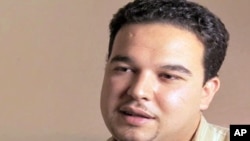Among Morocco's poor, few are more destitute and disenfranchised than the estimated 15,000 sub-Saharan Africans who've become stranded there on their way to Europe. Ignored by Moroccans, rejected by the government, the migrants have few allies. In this week's edition of Making a Difference, VOA introduces you to Moroccan native Hicham Baraka is doing his best to lend a hand near Oujda, his home town, where about 2,000 migrants have set up camp .
These camps near Morocco's border with Algeria look temporary, but the undocumented migrants who live here often stay for years.
Blocked by Europe's hardened borders, and without legal status in Morocco, they survive by begging.
"Look at the kind of environment we live in. No work, no job. Many of us don't have people to call for money," Kingsley Okojie, a migrant from Nigeria said.
Moroccan authorities want them gone. The migrants describe periodic raids and deportations, with rides to the border, just a few miles away.
But one Moroccan is helping. He is Hicham Baraka of the Beni Znassen Association. It's named after a Berber tribe in the area.
"In Muslim culture if someone knocks at your door and asks for bread or water, you give it," Baraka said.
Baraka's group provides food, clothes, and blankets to the migrants.
"They always came to this place with some food and they help us," migrant Fred Ogbeifuu said. "So I use this opportunity to thank them. Mr. Hicham's organization."
The group also monitors human rights abuses and lobbies authorities to treat migrants better.
Baraka says because so many Moroccans migrate to Europe, Morocco should set a better example. "If Morocco attacks these migrants, it gives carte blanche for my brother in Spain, my brother in Belgium, for the authorities in Spain or Belgium or France or Italy to attack Moroccan immigrants," he said.
As the only organization working with migrants in the area, there are constant calls for help.
A pregnant Congolese migrant needs a doctor. She's gone into labor. But offering help comes with a risk. Moroccan law is vague on whether it's legal to help undocumented migrants. Baraka worries that the rules could be used against him.
And he's afraid of criminals who smuggle people and drugs to Europe.
"Because of the immigrants' situation, we work with strangers. I don't always know the person I'm talking to," Baraka said.
What keeps him going are the stories of migrants like Kingsley Okojie, one of only two survivors on a truck carrying 27 migrants that lost its way in the Sahara.
"A migrant is someone trying to live, someone looking for a better life," Baraka explained. "It's not a criminal, not a dangerous person."
He says he feels obligated to try and stop the suffering









